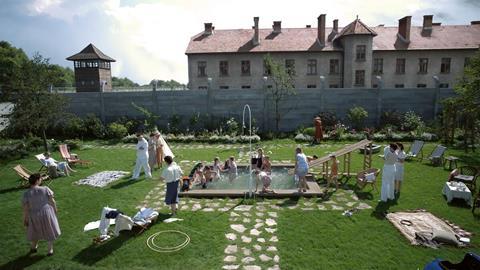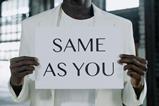The horror of evil is not that it is rare, but that it is so common and banal, says Guy Hewitt

The biblical precept “you shall love your neighbour as yourself” (Leviticus 19:18) came into sharp focus recently, as many marked Race Equality Week and Racial Justice Sunday as part of our journey towards being “one in Christ Jesus” (Galatians 3:28)
Notwithstanding this universal, transcendent principle, the perpetuation of ethnic conflicts around the world, the politicisation of migration issues and the dehumanisation of refugee and asylum matters suggests that we are still some distance from our destination.
A timely reminder
Those unable to participate in these temporal or spiritual observances have another opportunity to embrace the notion of our common history and shared destiny as Abraham’s children through the Jonathan Glazer Holocaust movie The Zone of Interest.
It is a timely release given the global spike in nationalism, fascism, racism, antisemitism and Islamophobia.
The film is adapted from the fictional novel by Martin Amis, inspired by the life of Rudolf Höss, the longest-serving commandant of Auschwitz. Unlike other films in the genre, it declines to show us the atrocities of Auschwitz, instead setting much of the story in the Höss household. The focus is on the the rural bliss enjoyed by the family in their handsomely-appointed home that abuts the notorious Nazi concentration camp.
But the violence is never far away, even if it is not seen. The ‘normalcy’ of the Höss daily routine is punctuated by screams, cries and barks; the firing of weapons, the chug of trains and the smokestacks billowing behind their garden wall. At night, the flames of the crematoria turn the sky a brilliant red. Their dream home is built on others’ nightmares.
Disassociation and denial
This isn’t to suggest that the movie is about people living in blissful ignorance. They know what’s happening over the wall; indeed, their entire life is built on it. They simply dissociate from the horror.
In one scene, the father drags his children out of a river because human remains have washed downstream. In another, the mother tries on a stolen fur coat, and when a young servant is seemingly inattentive, she warns her (with frightening calmness) that her husband “would spread your ashes across the fields” on the other side of the wall topped with barbed wire.
The line between good and evil is permeable and almost anyone can be induced to cross it
In another chilling vignette, their son, a member of Hitler Youth, sorts through teeth for gold fillings. Two children play in the backyard, one locking the other in the greenhouse, mimicking the hissing of a gas chamber. Rape and sexual violence are revealed.
The profundity of The Zone of Interest is in the coexistence of placidly respectable German lives with the horrors of the societal barbarity towards Jews, Gypsies, Slavs and homosexuals. We see Rudolf Höss, sounding like the quintessential company man, engaged with industrialists as they seek to design a more efficient mass-extermination system, as if it were an ordinary manufacturing challenge.
The banality of evil
How did such evil flourish? What this movie speaks to so potently is the reality that, with the proper incentives - particularly personal comfort or gain - the most ordinary of people can be complicit in horrendous acts, such as the Holocaust or the Transatlantic Slave Trade.
The movie brings into sharp focus the “banality of evil”; a concept developed by Hannah Arendt in Eichmann in Jerusalem (Penguin Classics), based on her assessment of Adolf Eichmann, the architect of The Final Solution.
Referring to Eichmann’s lack of guilt for his actions or hatred for those trying him, Arendt argued that, while Eichmann might have had anti-Semitic leanings, he showed “no case of insane hatred of Jews, or fanatical antisemitism or indoctrination of any kind.” Instead, he claimed he was simply “doing his job.”
Arendt’s hypothesis discredits the idea that Nazi criminals were psychopathic or fanatically different from ‘normal’ people. She contends that to see those capable of prejudice, slavery, torture or extermination as sub-human is deceptive. Rather, given the right conditions, ordinary people can all perpetuate or ignore the suffering of others.
In this way, The Zone of Interest echoes slavery narratives such as Alex Haley’s seminal Roots, as well as Amistad, Django Unchained, 12 Years a Slave, and Harriet. It reminded me that this great crime against humanity - which enriched nations and individuals alike, providing the financial and organisational means to develop our modern world - was devised politically, constructed legally, justified scripturally and accepted socially.
The norm, not the exception
As with the Holocaust, most knew better with regard to the Transatlantic Slave Trade which, according to University College London’s Legacies of British Slavery project, significantly contributed to the wealth of 10-20 per cent of Britain’s richest individuals and institutions.
Lambeth Palace’s exhibition, Enslavement: Voices from the Archives, records Rev Morgan Godwyn, a Church of England priest who served in Virginia and Barbados, valiantly condemning the Crown and state for it’s role.
In his last published sermon, delivered at Westminster Abbey in 1685 and addressed to King James II, he stated: “We have exceeded the worst of infidels by our first enslaving and then murdering men’s souls. For how can it be endured that a Nation once so famous for zeal and piety…should prostrate herself to that foul idol mammon, and worship trade.” Shortly after, Rev Godwyn disappeared, presumed murdered for taking a stand.
This is a timely release given the global spike in nationalism, fascism, racism, anti-Semitism and Islamophobia
Banality, in this sense, does not mean that the actions of Rudolf Höss and his family were not monstrous, but that monstrosity is much closer to the norm than the exception. The line between good and evil is permeable and almost anyone can be induced to cross it. Watching The Zone of Interest ought to help us confront the horror of this reality and cause us to think - and hopefully act - to ensure that such evil is never again able to take root.
We have a moral imperative to fight against oppression and all forms of exclusion wherever they manifest themselves and in whatever form.
Not all history is glorious, and perhaps the dreadfulness is the more important part to learn from. As we journey on, it is my hope and prayer that they will know we are Christians by our love.
Zone of Interest is now playing in selected UK cinemas




































2 Readers' comments